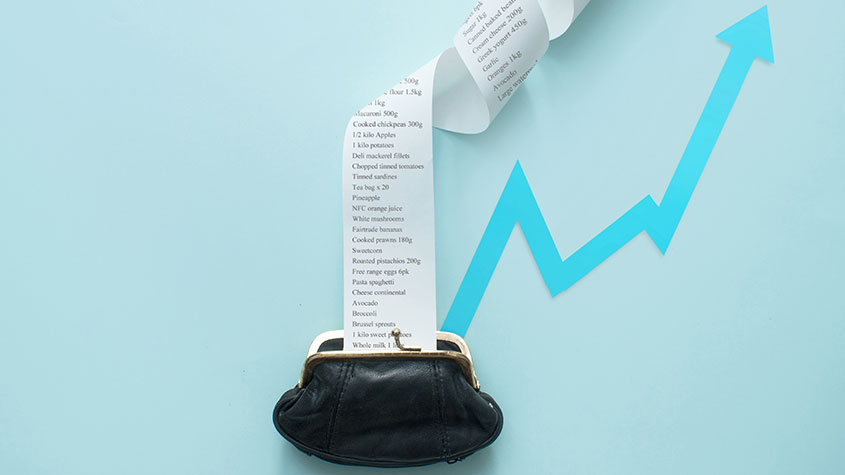UK inflation hits 41-year high of 11.1%
The rising costs of energy and food have pushed the figure up to its highest level since 1981.


Get the latest financial news, insights and expert analysis from our award-winning MoneyWeek team, to help you understand what really matters when it comes to your finances.
You are now subscribed
Your newsletter sign-up was successful
Want to add more newsletters?
Energy bills and food prices pushed inflation up to 11.1% in the 12 months to October, the latest data from the Office for National Statistics (ONS) showed – up from 10.1% in September.
This is the highest inflation figure since ONS records began in 1997. Modelled consumer price inflation estimates suggest this is the highest rate since October 1981.
Gas and electricity prices were the main drivers, rising 24.3% between September and October despite the introduction of the energy price guarantee (EPG) which capped the unit cost of electricity and gas, and will be in place until March 2023. Without the guarantee the ONS estimates the rise would have been 75%, and the overall annual inflation rate 13.8%.
Try 6 free issues of MoneyWeek today
Get unparalleled financial insight, analysis and expert opinion you can profit from.

Sign up to Money Morning
Don't miss the latest investment and personal finances news, market analysis, plus money-saving tips with our free twice-daily newsletter
Don't miss the latest investment and personal finances news, market analysis, plus money-saving tips with our free twice-daily newsletter
Households are paying around 88.9% more for their electricity and gas than they were a year ago.
Increased food prices were the second largest cause for the increase, with food and non-alcoholic beverage prices up 16.4% in the 12 months to October 2022. They are currently at their highest since September 1977. Milk, cheese and eggs saw the steepest price increases.
Motor fuel prices fell marginally by 0.5% between September and October, however at the pump petrol and diesel remain 22.2% more expensive than they were in October 2021, the ONS said. The annual inflation rate for transport was 9.3%, down for a fourth consecutive month, which led to a 0.18% point downard contribution to the change in annual inflation rate.
“The aftershock of Covid and Putin’s invasion of Ukraine is driving up inflation in the UK and around the world,” said chancellor Jeremy Hunt. “This insidious tax is eating into pay cheques, household budgets and savings, while thwarting any chance of long-term economic growth.
“It is our duty to help the Bank of England in their mission to return inflation to target by acting responsibly with the nation’s finances. That requires some tough but necessary decisions on tax and spending to help balance the books.”
Take a look at our article on what to expect in Hunt’s Autumn Budget tomorrow (17 November).
What does rising inflation mean for you?
Inflation is running way over the government’s 2% target. To help bring it back down, the Bank of England has announced a series of increases to the base rate; currently it sits at 3%. That’s the highest it’s been since 2008, and chief economist Huw Pill has said it’s likely that interest rates will go up again as the BoE has “more to do” to get inflation under control. The next interest rate announcement is expected on 15 December.
Hunt will also be outlining his fiscal plan for the nation tomorrow, which is expected to include a range of tax allowance freezes to raise more money for the government.
Rising inflation is eating away at savings, eroding purchasing power and widening inequality. There are currently no savings accounts that offer an interest rate above inflation “but this should not discourage savers from comparing rates and switching to a better deal”, says Rachel Springall, finance expert at Moneyfacts. Providers have been reviewing their cash interest rates a lot recently and deals come in and out of the market quickly, so savers will have to act fast to secure the best savings accounts.
Further rate rises will also affect homeowners and borrowers in general as they face higher repayment costs. While house prices have begun to fall, mortgage rates are sitting at over 6% which might make you wonder whether now is a good time to buy a house.
“While the headline figure of 11.1% is useful to have, in reality everyone’s personal inflation figures will be different,” says Laura Suter, head of personal finance at AJ Bell. “If you spend more of your income on food and energy bills, and aren’t benefiting from lower petrol and car prices, your headline figure will be far higher.”
Get the latest financial news, insights and expert analysis from our award-winning MoneyWeek team, to help you understand what really matters when it comes to your finances.
Nic studied for a BA in journalism at Cardiff University, and has an MA in magazine journalism from City University. She has previously worked for MoneyWeek.
-
 Do you face ‘double whammy’ inheritance tax blow? How to lessen the impact
Do you face ‘double whammy’ inheritance tax blow? How to lessen the impactFrozen tax thresholds and pensions falling within the scope of inheritance tax will drag thousands more estates into losing their residence nil-rate band, analysis suggests
-
 Has the market misjudged Relx?
Has the market misjudged Relx?Relx shares fell on fears that AI was about to eat its lunch, but the firm remains well placed to thrive
-
 UK wages grow at a record pace
UK wages grow at a record paceThe latest UK wages data will add pressure on the BoE to push interest rates even higher.
-
 Trapped in a time of zombie government
Trapped in a time of zombie governmentIt’s not just companies that are eking out an existence, says Max King. The state is in the twilight zone too.
-
 America is in deep denial over debt
America is in deep denial over debtThe downgrade in America’s credit rating was much criticised by the US government, says Alex Rankine. But was it a long time coming?
-
 UK economy avoids stagnation with surprise growth
UK economy avoids stagnation with surprise growthGross domestic product increased by 0.2% in the second quarter and by 0.5% in June
-
 Bank of England raises interest rates to 5.25%
Bank of England raises interest rates to 5.25%The Bank has hiked rates from 5% to 5.25%, marking the 14th increase in a row. We explain what it means for savers and homeowners - and whether more rate rises are on the horizon
-
 UK inflation remains at 8.7% ‒ what it means for your money
UK inflation remains at 8.7% ‒ what it means for your moneyInflation was unmoved at 8.7% in the 12 months to May. What does this ‘sticky’ rate of inflation mean for your money?
-
 Would a food price cap actually work?
Would a food price cap actually work?Analysis The government is discussing plans to cap the prices of essentials. But could this intervention do more harm than good?
-
 The cost of petrol in the UK compared with the rest of the world
The cost of petrol in the UK compared with the rest of the worldNews The price of petrol in the UK went through the roof last year, but has since settled. We look at how UK petrol price compares with the rest of the world.
